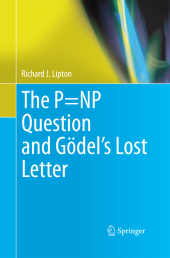 Neuerscheinungen 2014Stand: 2020-02-01 |
Schnellsuche
ISBN/Stichwort/Autor
|
Herderstraße 10
10625 Berlin
Tel.: 030 315 714 16
Fax 030 315 714 14
info@buchspektrum.de |

Richard J. Lipton
The P=NP Question and Gödel´s Lost Letter
2010. 2014. xiii, 239 S. 235 mm
Verlag/Jahr: SPRINGER, BERLIN; SPRINGER US; SPRINGER 2014
ISBN: 1-489-99272-3 (1489992723)
Neue ISBN: 978-1-489-99272-7 (9781489992727)
Preis und Lieferzeit: Bitte klicken
The P=NP question is one of the great problems of science, which has intrigued computer scientists and mathematicians for decades. This guide, originating from a weblog written by the author, covers historical developments and latest approaches to the problem.
? DoesP=NP. In just ?ve symbols Dick Karp -in 1972-captured one of the deepest and most important questions of all time. When he ?rst wrote his famous paper, I think it´s fair to say he did not know the depth and importance of his question. Now over three decades later, we know P=NP is central to our understanding of compu- tion, it is a very hard problem, and its resolution will have potentially tremendous consequences. This book is a collection of some of the most popular posts from my blog- Godel Lost Letter andP=NP-which I started in early 2009. The main thrust of the blog, especially when I started, was to explore various aspects of computational complexity around the famousP=NP question. As I published posts I branched out and covered additional material, sometimes a timely event, sometimes a fun idea, sometimes a new result, and sometimes an old result. I have always tried to make the posts readable by a wide audience, and I believe I have succeeded in doing this.
The Problem.- G odel´s Lost Letter.- Cook´s Insight.- Karp Hits Twenty-One.- Nondeterminism.- Why Polynomial Time?.- P=NP and Insider Baseball.- The Knapsack Problem: An Exponential Algorithm.- A Nightmare about P=NP.- The One Page Challenge.- P=NP and Big O Notation.- More Abuse of O-Notation.- Our Problem is More Important Than Your Problem.- The Magic of P 6= NP.- P=NP and the End of Security.- The LBA Problem.- P=NP and The Three Bears.- Bait and Switch: Why Lower Bounds Are So Hard.- The Knapsack Problem: A Lower Bound.- There are Big Circuits Out There.- Knapsack: An Upper Bound.- Hilbert and P=NP.- Are All NP-Complete Problems The Same?.- The Real P=NP Problem.- P=NP in Other Worlds.- P=NP and the Structure of the World.- Do Impossibility Results Matter?.- Circuit Lower Bounds.- The Core of a Problem Who is Afraid of Natural Proofs?.- False Proofs by Famous People.- Cryptography Turned Upside Down Ramsey´s Theorem Meets P=NP.- Shooting Down Proofs P=NP.- Where are the Movies?.- P=NP : What are the Odds?.-
Richard Lipton is the Storey Professor of Computer Science at Georgia Institute of Technology. Previously he held faculty positions at Yale University, the University of California at Berkeley, and Princeton University. His research is focused primarily, but not exclusively, on theory of computation. He has made seminal contributions to many areas of computing from software engineering and program testing, to computer security and cryptography, to DNA and molecular computation, and to other areas of computer science. He is a member of The National Academy of Engineering, an ACM Fellow, and a Guggenheim fellow.


